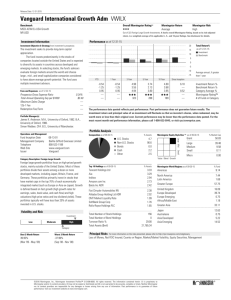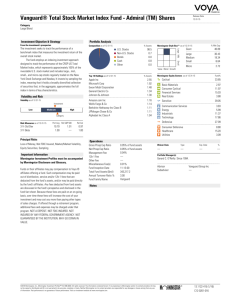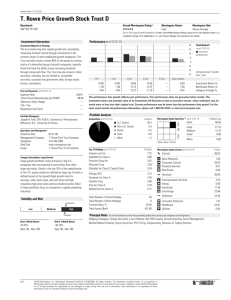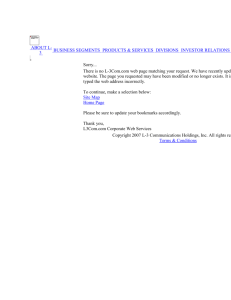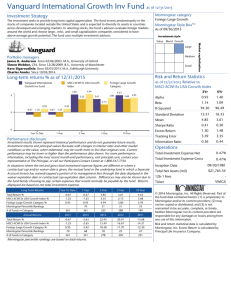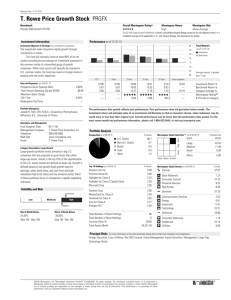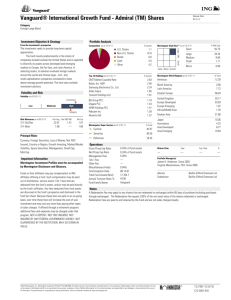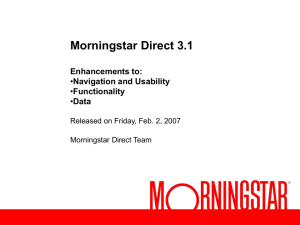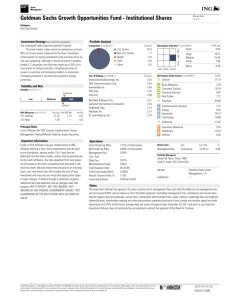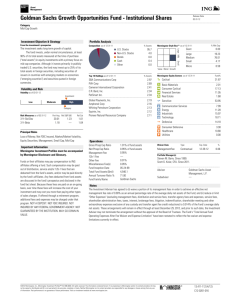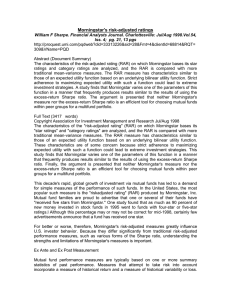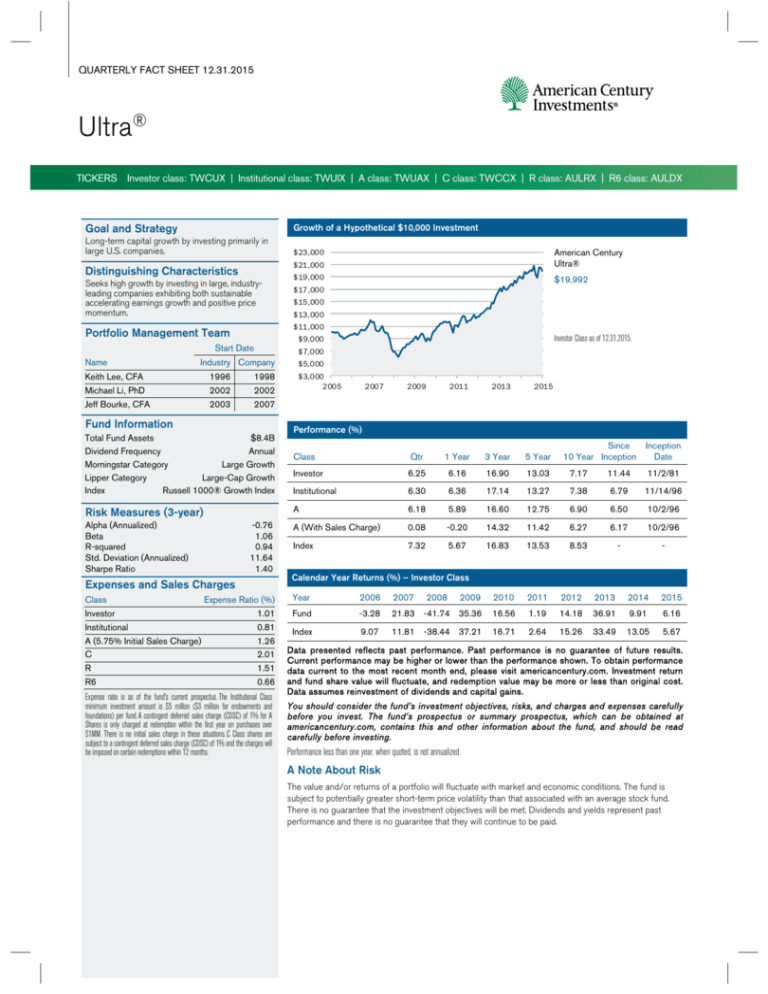
QUARTERLY FACT SHEET 12.31.2015
Ultra®
TICKERS Investor class: TWCUX | Institutional class: TWUIX | A class: TWUAX | C class: TWCCX | R class: AULRX | R6 class: AULDX
Goal and Strategy
Growth of a Hypothetical $10,000 Investment
Long-term capital growth by investing primarily in
large U.S. companies.
$23,000
Distinguishing Characteristics
Seeks high growth by investing in large, industryleading companies exhibiting both sustainable
accelerating earnings growth and positive price
momentum.
$19,992
$17,000
$15,000
$13,000
Investor Class as of 12.31.2015.
$7,000
Industry Company
Keith Lee, CFA
1996
1998
Michael Li, PhD
2002
2002
Jeff Bourke, CFA
2003
2007
Fund Information
$5,000
$3,000
2005
2007
2009
2011
2013
2015
Class
Qtr
1 Year
3 Year
5 Year
Investor
6.25
6.16
16.90
13.03
7.17
11.44
11/2/81
Institutional
6.30
6.36
17.14
13.27
7.38
6.79
11/14/96
A
6.18
5.89
16.60
12.75
6.90
6.50
10/2/96
A (With Sales Charge)
0.08
-0.20
14.32
11.42
6.27
6.17
10/2/96
Index
7.32
5.67
16.83
13.53
8.53
-
-
Performance (%)
Total Fund Assets
$8.4B
Annual
Dividend Frequency
Large Growth
Morningstar Category
Large-Cap Growth
Lipper Category
Index
Russell 1000® Growth Index
Risk Measures (3-year)
Alpha (Annualized)
Beta
R-squared
Std. Deviation (Annualized)
Sharpe Ratio
-0.76
1.06
0.94
11.64
1.40
Since
10 Year Inception
Inception
Date
Calendar Year Returns (%) – Investor Class
Expenses and Sales Charges
Investor
Institutional
A (5.75% Initial Sales Charge)
C
R
R6
$19,000
$9,000
Start Date
Class
American Century
Ultra®
$11,000
Portfolio Management Team
Name
$21,000
Expense Ratio (%)
Year
2006
2007
2009
2010
2011
2012
2013
2014
2015
1.01
0.81
1.26
2.01
1.51
0.66
Fund
-3.28
21.83 -41.74 35.36
16.56
1.19
14.18
36.91
9.91
6.16
Index
9.07
11.81 -38.44 37.21
16.71
2.64
15.26
33.49
13.05
5.67
Expense ratio is as of the fund's current prospectus. The Institutional Class
minimum investment amount is $5 million ($3 million for endowments and
foundations) per fund.A contingent deferred sales charge (CDSC) of 1% for A
Shares is only charged at redemption within the first year on purchases over
$1MM. There is no initial sales charge in these situations. C Class shares are
subject to a contingent deferred sales charge (CDSC) of 1% and the charges will
be imposed on certain redemptions within 12 months.
2008
Data presented reflects past performance. Past performance is no guarantee of future results.
Current performance may be higher or lower than the performance shown. To obtain performance
data current to the most recent month end, please visit americancentury.com. Investment return
and fund share value will fluctuate, and redemption value may be more or less than original cost.
Data assumes reinvestment of dividends and capital gains.
You should consider the fund’s investment objectives, risks, and charges and expenses carefully
before you invest. The fund’s prospectus or summary prospectus, which can be obtained at
americancentury.com, contains this and other information about the fund, and should be read
carefully before investing.
Performance less than one year, when quoted, is not annualized.
A Note About Risk
The value and/or returns of a portfolio will fluctuate with market and economic conditions. The fund is
subject to potentially greater short-term price volatility than that associated with an average stock fund.
There is no guarantee that the investment objectives will be met. Dividends and yields represent past
performance and there is no guarantee that they will continue to be paid.
Ultra®
QUARTERLY FACT SHEET 12.31.2015
Portfolio Characteristics1
Fund
Index
75
-
$170.1B
$143.5B
Equity Holdings
Weighted Average
Market Cap
Sector Weights1 (%)
Portfolio Weight vs. Index
2.93
1.21
1.02
Price/Earnings Ratio
23.23x
22.49x
4.76x
4.90x
Price/Book Ratio
0.78
-0.04
1
Investment Blend (%)
Domestic Stock
-0.38
95.15
Foreign Stock
Cash And Cash Alternatives
-0.77
-1.10
2.82
-1.65
2.03
-1.99
Top Ten Holdings 1 (%)
-4
0
Sector
Fund
Index
Information Technology
31.44
28.51
Health Care
17.73
16.52
Consumer Discretionary
22.41
21.39
Energy
1.43
0.65
Utilities
0.00
0.04
Industrials
10.52
10.90
Financials
4.73
5.50
Consumer Staples
9.80
10.90
Materials
1.94
3.59
Telecommunication Services
0.00
1.99
4
Apple Inc
8.72
Alphabet Inc
5.63
Morningstar Rating – Investor Class
Amazon.com Inc
4.49
Morningstar Category – Large Growth
Overall
3 Year
5 Year
10 Year
Starbucks Corp
3.58
Rating
Facebook Inc
3.18
# of Funds
1,542
1,542
1,326
933
Gilead Sciences Inc
3.08
Visa Inc
2.97
Costco Wholesale Corp
2.96
Celgene Corp
2.73
MasterCard Inc
2.71
Total Percent in Top 10 Holdings
40.05
The holdings listed should not be considered recommendations to purchase
or sell a particular security. Equity holdings are grouped to include common
shares, depository receipts, rights and warrants issued by the same company.
Fund holdings subject to change.
1
As of 11/30/2015.
For each fund with at least a three-year history, Morningstar calculates a Morningstar Rating™ based on a Morningstar Risk-Adjusted Return measure that accounts for
variation in a fund’s monthly performance (including the effects of sales charges, loads and redemption fees), placing more emphasis on downward variations and rewarding
consistent performance. The Overall Morningstar Rating™ for a fund is derived from a weighted average of the performance figures associated with its three-, five- and tenyear (if applicable) Morningstar Rating™ metrics. The top 10% of funds in each category receive 5 stars, the next 22.5% receive 4 stars, the next 35% receive 3 stars, the
next 22.5% receive 2 stars and the bottom 10% receive 1 star. (Each share class is counted as a fraction of one fund within this scale and rated separately, which may cause
slight variations in the distribution percentages.) Past performance is no guarantee of future results.
Lipper Rankings – Investor Class
Lipper Category – Large-Cap Growth
Fund
Percentile
1 Year
3 Year
5 Year
10 Year
287/668 216/615 187/545 237/389
43%
36%
35%
61%
Lipper rankings are based on average annual total returns. All of the mutual fund performance information contained in this table was supplied by Lipper, a
Reuters Company, subject to the following: Copyright 2016© Reuters. All rights reserved. Any copying, republication or redistribution of Lipper content, including
by caching, framing or similar means, is expressly prohibited without prior written consent of Lipper. Lipper shall not be liable for any errors or delays in the
content, or for any actions taken in reliance thereon.
DUE TO MARKET VOLATILITY, CURRENT PERFORMANCE MAY BE DIFFERENT THAN THE FIGURES SHOWN.
©2016 Morningstar, Inc. All Rights Reserved. Certain information contained herein: (1) is proprietary to Morningstar and/or its content providers; (2) may not be copied or distributed; and (3) is not warranted to be accurate, complete or timely. Neither
Morningstar nor its content providers are responsible for any damages or losses arising from any use of this information.
The Russell 1000® Index measures the performance of the 1,000 largest companies in the Russell 3000® Index (the 3,000 largest publicly traded U.S. companies based on total market capitalization). The Russell 1000® Growth Index measures the
performance of those Russell 1000® companies with higher price-to-book ratios and higher forecasted growth values. Created by Frank Russell Company, indices are not investment products available for purchase.
Key Terms: Alpha/3yr (annualized) - Shows how a fund did relative to what would have been expected given the fund's Beta and the performance of the benchmark index. For example, an alpha of 1.4 means that the fund outperformed its estimated
return (based on market activity alone) by 1.4%. Beta measures the volatility of the fund, as compared to that of the overall market. The market’s beta is set at 1.00; a beta higher than 1.00 is considered to be more volatile than the market, while a beta
lower than 1.00 is considered to be less volatile. Weighted average market capitalization is the average of the weighted capitalizations of a portfolio’s holdings. Price/Earnings ratio (P/E) is the ratio of a stock’s price to its earnings per share.
Price/Book ratio (P/B) is the ratio of a stock’s price to its book value per share. R2 - (R-squared) is a statistic that indicates how much of a fund’s fluctuations were attributable to movements in the fund’s benchmark index. Sharpe Ratio measures
the potential reward offered by a mutual fund relative to its risk level. Developed by William Sharpe, the ratio uses a fund's standard deviation and its excess return to determine reward per unit of risk. The higher the sharpe ratio, the better the fund's
historical risk-adjusted performance. Std. Deviation/3yr (annualized) - Defines how widely returns varied from an average over a given period of time. A higher standard deviation means a more volatile fund. For example, a fund with a standard deviation
of 6 and an average annual return of 10% saw annualized monthly returns fall within 6 percentage points of that average (or between 4% and 16%) two-thirds of the time.
Fund Facts are provided by FactSet Research Systems, Inc.
American Century Investment Services, Inc., Distributor
©2016 American Century Proprietary Holdings, Inc. All rights reserved.
IN-FFS-88013 1601
Non-FDIC Insured • May Lose Value • No Bank Guarantee
Rev 0 1/13/2016 8:26:39 AM-EQ

